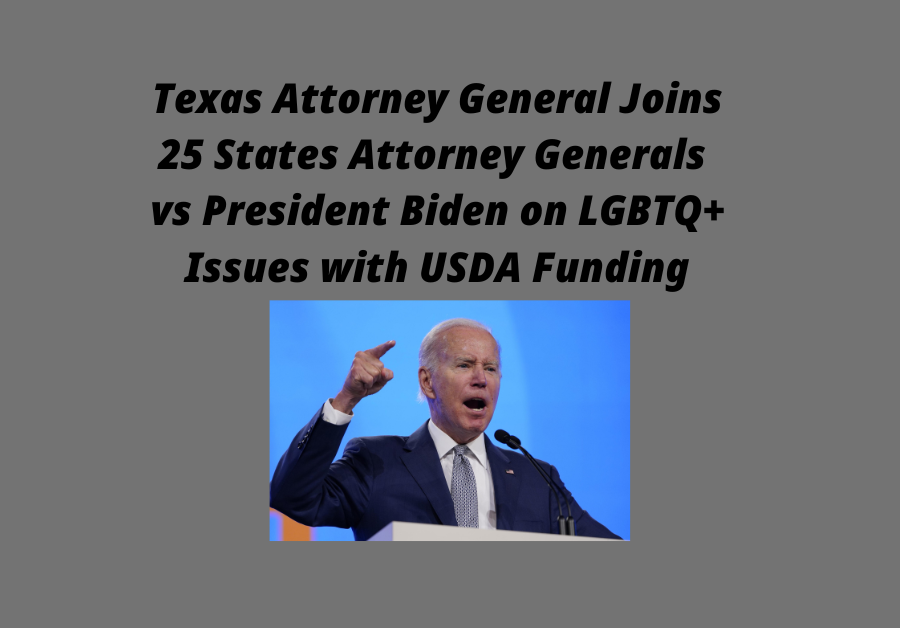| AG Paxton Demands Biden Withdraw Guidance Tying School Lunch Programs to Radical Sex and Gender Agenda |
AUSTIN – Texas Attorney General Ken Paxton joined a Tennessee-led multistate letter to President Biden urging him to withdraw new guidance from the U.S. Department of Agriculture (USDA) regarding “sex discrimination” for schools and programs that receive federal nutritional assistance. This new guidance relies on an unsupportable expansion of the U.S. Supreme Court decision in Bostock v. Clayton County, 140 S. Ct. 1731 (2020), which interpreted the statutory definition of “sex” in Title VII to include sexual orientation and gender identity. If followed, the guidance would wrongly extend Bostock into the Title IX context—which extension the Supreme Court expressly disclaimed—and impose new and unlawful regulations on state agencies and operators receiving financial assistance through USDA.
“The Biden Administration is attempting to force every state and local entity to adopt its sexual orientation and gender identity agenda—or suffer massive financial consequences,” said Attorney General Paxton. “Bostock was wrong from the start, and any unlawful expansion of it into new areas is doubly wrong. I won’t let Biden’s Department of Agriculture bully Texas into adopting its radical agenda or use kids and school lunch programs as his pawns.”
Here is the letter sent to President Biden
Dear Mr. President,
The USDA Food and Nutrition Services Civil Rights Division (“FNS”) enforces Title IX
and the Food and Nutrition Act’s respective prohibitions on sex discrimination. On May 5, 2022,
it issued a memorandum purporting to be a “policy update.” See Application of Bostock v. Clayton
County to Program Discrimination Complaint Processing – Policy Update, CRD 01-2022
(“Guidance”). The Guidance states that it is intended to “provide direction to state agencies and
program operators regarding processing program complaints that allege discrimination on the basis
of gender identity and sexual orientation in programs or activities receiving federal financial
assistance.” Id.
But by vastly expanding the concept of “discrimination on the basis of sex” to include
gender identity and sexual orientation, the Guidance does much more than offer direction. It
imposes new—and unlawful—regulatory measures on state agencies and operators receiving
federal financial assistance from the USDA. And the inevitable result is regulatory chaos that
would threaten the effective provision of essential nutritional services to some of our most
vulnerable citizens.
As the chief legal officers of our respective States, the undersigned Attorneys General have
an obligation to uphold the rule of law and to represent the best interests of our citizens and their
institutions. We are, therefore, writing to you to explain why this Guidance is unlawful and to
request that you direct the USDA to withdraw it.
First, the Guidance is unlawful because it was issued without providing the States and other
stakeholders the opportunity for input as required by the Administrative Procedures Act (“APA”).
Second, the Guidance is unlawful because the USDA has premised it on an obvious misreading
and misapplication of the Supreme Court’s holding in Bostock v. Clayton County, 140 S. Ct. 1731
(2020).
The Guidance must be withdrawn because it should have been—but was not—issued in
compliance with the APA. The APA requires that the public be given notice and afforded the
opportunity to comment when a government agency engages in substantive law- or policymaking.
While bona fide administrative guidance, non-legislative rules, and interpretative rules are
generally exempt from the notice-and-comment requirements of the APA, 5 U.S.C. § 553(b)(A),
an administrative agency may not invoke those exemptions by labeling its lawmaking or
policymaking actions as “clarification” or “guidance.” See Am. Hosp. Ass’n v. Bowen, 834 F.2d
1037, 1045 (D.C. Cir. 1987) (the label an agency attaches to its actions is not dispositive).
But that is how the USDA has tried to circumvent the requirements of the APA here. It
has passed off as a “clarification” what is actually a re-write of the law in Title IX and the Food
and Nutrition Act. Far from providing clarification as to Title IX law, the Guidance substantially
and substantively expands the law. It broadens the basis for challenging a certification of applicant
households and imposes additional burdens on state agencies—including state and local
governments—that facilitate various USDA nutritional programs. See Guidance at 3. It also
creates new legal claims for liability and orders States to take concrete steps towards compliance
by August 3, 2022. And it is clear that USDA intends to issue further “guidance” in the same vein.
See Questions and Answers Related to CRD 01-2022 Application of Bostock v. Clayton County to
Program Discrimination Complaint Processing – Policy Update, CRD 02-2022 (May 5, 2022).
The Guidance must be withdrawn, too, because its purported “clarification” is premised on
a misreading and unwarranted extension of Bostock. The USDA cannot point to Bostock to justify
its interpretation of Title IX because Bostock concerned only Title VII; Bostock expressly
disclaimed application to “other federal or state laws that prohibit sex discrimination”—like Title
IX and the Food and Nutrition Act—and expressly did not “prejudge any such questions.” 140 S.
Ct. at 1753. And since “Title VII differs from Title IX in important respects,” “it does not follow
that principles announced in the Title VII context automatically apply in the Title IX context.”
Meriwether v. Hartop, 992 F.3d 492, 510 n.4 (6th Cir. 2021); see also U.S. Dep’t of Educ.,
Memorandum for Kimberly M. Richey Acting Assistant Secretary of the Office for Civil Rights Re:
Bostock v. Clayton Cty., 140 S. Ct. 1731 (2020), at 1-4 (Jan. 8, 2021) (acknowledging that Bostock did not construe Title IX and “does not affect the meaning of ‘sex’ as that term is used in Title IX”).
We have long had a productive relationship with the federal government, managing various
food and nutrition programs guided by the principles of cooperative federalism. We would like to
continue this cooperative relationship. But the Guidance flouts the rule of law, relies on patently
incorrect legal analysis that is currently under scrutiny in the federal courts, and was issued without
giving the States the requisite opportunity to be heard. While we are always open to working with
your Administration to resolve these matters, under the present circumstances we are constrained
to ask that you direct Secretary Vilsack and the Department of Agriculture to rescind this
Guidance.
The letter was signed by 26 of the 50 states attorney generals:
- Herbert H. Slatery III -Tennessee Attorney General and Reporter
- Steve Marshall – Alabama Attorney General
- Treg R. Taylor – Alaska Attorney General
- Mark Brnovich – Arizona Attorney General
- Leslie C. Rutledge – Arkansas Attorney General
- Ashley Moody – Florida Attorney General
- Christopher M. Carr – Georgia Attorney General
- Lawrence G. Wasden – Idaho Attorney General
- Todd Rokita – Indiana Attorney General
- Derek Schmidt – Kansas Attorney General
- Daniel Cameron – Kentucky Attorney General
- Jeff Landry – Louisiana Attorney General
- Lynn Fitch – Mississippi Attorney General
- Eric Schmitt – Missouri Attorney General
- Austin Knudsen – Montana Attorney General
- Douglas J. Peterson – Nebraska Attorney General
- Drew H. Wrigley – North Dakota Attorney General
- Dave Yost – Ohio Attorney General
- John M. O’Connor – Oklahoma Attorney General
- Alan Wilson – South Carolina Attorney General
- Jason R. Ravnsborg – South Dakota Attorney General
- Ken Paxton – Texas Attorney General
- Sean D. Reyes – Utah Attorney General
- Patrick Morrisey – West Virginia Attorney General
- Bridget Hill – Wyoming Attorney General
- Jason S. Miyares – Virginia Attorney General



























